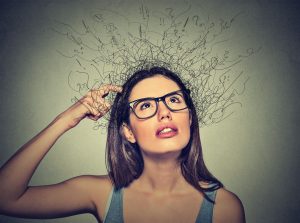
From the moment I went to back to college to change careers in 2004, ADHD has been the go-to diagnosis for struggling with focus and concentration. The more I look into it, the less we know about it. There are the diagnostic criteria (the items we professionals have to make sure are there before we can give you an official diagnosis) which fall woefully short of the number of issues people with this diagnosis struggle with on a daily basis.
** If you came to this page because you want to see if I do ADHD assessments, I do some. You can see that information here.
These types of ADHD were renamed “presentations” in the most recent version of the DSM, the DSM-V. People often move from one subtype to another. Because they now recognize that people can have different challenges, not just at different ages, but in different situations, I’m going to give you a huge list of symptoms.
ADHD symptoms include:
- inattention
- lack of focus
- poor time management
- weak impulse control
- exaggerated emotions
- hyperfocus
- hyperactivity
- executive dysfunction (executive functioning includes working memory, flexible thinking, and self-control of emotions and behaviors).
- difficulty regulating emotions
- sleep problems
- Failing to give attention to detail or making careless mistakes.
- Struggles with sustained attention – including when listening in a conversation or reading.
- Leaves tasks undone or doesn’t follow through on instructions, even if they participated in the decision making process to set up the task.
- Trouble with organizing tasks, activities, school work, assignments for work or college. This why ADHD makes people appear to be messy when they are not – it can be a struggle to organize tasks and then complete them.
- Anything that requires sustained mental effort may be avoided (procrastination).
- Loses things, misplaces things (keys in freezer).
- Easily distracted by noises or errant thoughts.
- Fidgety. Restless movements.
- Cannot stay in their seats for a prolonged period of time.
- Difficulty playing quietly. (Self monitoring of behavior, in psychobabble terms).
- Excessive talking
- Cannot wait their turn, impatient. It’s actually part of mental restlessness but comes across as impatient.
- Interrupts or intrudes on conversations, games, activities.
Official diagnoses, for those who have been or will be tested, fall into three categories:
- Primarily hyperactive-impulsive type
- Primarily inattentive type (formerly called ADD)
- Primarily combined type (most commonly diagnosed)

Now, if you read through all of that and still are frustrated because it does not match you, remember they update these regularly and that does not mean it will prevent you from getting diagnosed or medication, if you want. There’s a reason we (psychologists) only diagnose this after we learn a lot about you – it’s how your brain was wired from birth.
In fact, they linked it to Norepinephrine since that’s the neurotransmitter most affected by ADHD medications. A neurotransmitter in the brain. Which is why some anti-depressants help ADHD. Some are SNRI’s (serotonin norepinephrine reuptake inhibitors) which give brains more to work with. It also works with your stress and anxiety response. Which is why ADHD is usually diagnosed with anxiety and/or depression as well. So, this means Cymbalta, Effexor, and Pristiq can help with both anxiety and depression (serotonin) and ADHD (norepinephrine).
I’m not recommending medication, I’m a psychologist and am offering this information in case you want to have that talk with your doctor and see if that’s an option that would work for you.
Need to Know
Around 2/3 of children with ADHD also have another condition. Many adults are also impacted by the symptoms of another condition. Common conditions associated with ADHD include the following.
- Learning disabilities (Dyslexia, now called Reading Disorder, is also Neurodivergent)
- Anxiety and depression
- Obsessive-compulsive disorder
- Bipolar disorder
- Tourette’s syndrome
- Sleep disorders
- Bed-wetting
- Substance abuse
Videos Page – Here I have Video versions of Guided Meditations that help keep you focused because there is more going on.

If you want to see more – I have a YouTube channel as well (Serene Scenes).
Meditations for ADHD – click the link for the full library of them.
This is my most popular meditation. For ADHD, I added background noise to help with focusing.
